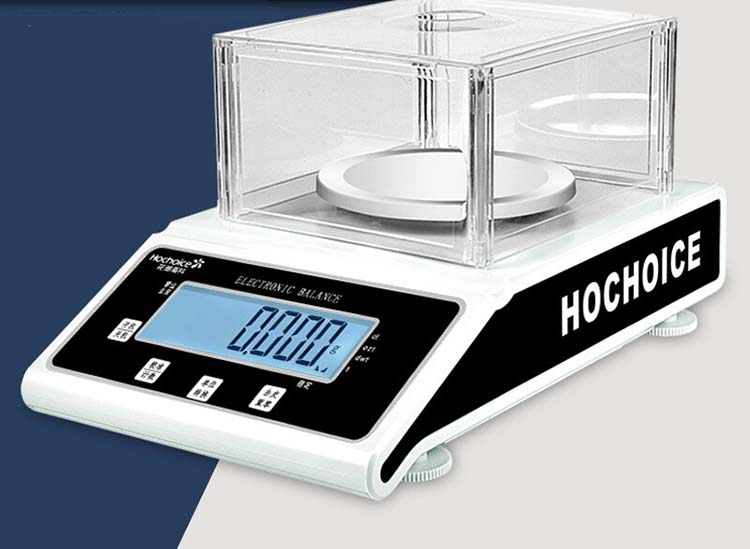Precision of Electronic Balances: Enhancing Measurement Reliability and Stability
Electronic balances are widely used in daily life, scientific experiments, industrial production, and healthcare, among other fields. The precision of an electronic balance directly impacts the reliability of measurement results, which is especially critical in industries that demand high accuracy. Shanghai Hochoice Apparatus Manufacturer Co., Ltd., specializing in the research, development, and manufacturing of electronic weighing instruments, is committed to providing high-precision, stable electronic balances that help various industries achieve more accurate measurements.

What is the Precision of an Electronic Balance?
Precision refers to how close the measurement results of an electronic balance are to the true weight. In fields such as scientific research, industrial production, and healthcare, the precision of an electronic balance often determines the accuracy of experiments or compliance with production standards. A higher-precision balance ensures accurate and reliable measurements, making precision one of the most important factors when selecting an electronic balance.
Factors Affecting the Precision of Electronic Balances
Quality of SensorsThe core component of an electronic balance is its load sensor, and the accuracy of the sensor directly impacts measurement results. High-quality sensors can detect even the slightest weight changes, ensuring highly accurate measurements. Products from Shanghai Hochoice Apparatus Manufacturer Co., Ltd. use advanced sensor technologies, ensuring high-precision weighing performance.
Environmental FactorsExternal factors like temperature, humidity, and air currents can affect the precision of an electronic balance. For instance, temperature fluctuations may cause the balance's zero point to drift, affecting measurement accuracy. To minimize these influences, many high-end electronic balances come with temperature compensation functions or anti-interference designs, ensuring stable measurements in various environments.
Stability of the BalanceThe stability of an electronic balance is another crucial factor affecting its precision. Even slight vibrations or external disturbances can lead to measurement errors. Therefore, high-precision electronic balances are often designed with features to enhance stability, such as shockproof bases or gravity compensation mechanisms. Products from Shanghai Hochoice Apparatus Manufacturer Co., Ltd. incorporate such designs to ensure high stability even with long-term use.
Regular CalibrationOver time, the accuracy of an electronic balance may degrade due to sensor wear or changes in environmental conditions. Regular calibration is essential to maintain precision. Many high-quality electronic balances, including those from Hochoice, are equipped with automatic calibration functions, making it easier to maintain high accuracy under various conditions.
Resolution of the BalanceThe resolution of an electronic balance determines the smallest measurable unit of weight. High-resolution balances are particularly important in applications requiring fine measurements, such as pharmaceutical research or scientific experiments. Shanghai Hochoice Apparatus Manufacturer Co., Ltd. offers a wide range of electronic balances with different resolutions and precision levels to meet the needs of various industries.
How to Improve the Precision of Electronic Balances?
Choose the Right Electronic BalanceDifferent applications require different levels of precision. For high-precision tasks such as scientific experiments or pharmaceutical formulations, it's essential to choose an electronic balance with high resolution and precise sensors. Shanghai Hochoice Apparatus Manufacturer Co., Ltd. offers a range of products, from high-resolution microbalances to standard industrial scales, to meet various application needs.
Maintain a Suitable Working EnvironmentEnvironmental factors significantly affect the precision of electronic balances. The balance should be placed in a stable, draft-free area, away from direct sunlight or temperature extremes. To ensure the accuracy of measurements, it is recommended to place the balance on a stable workbench and, if necessary, use accessories such as windshields to minimize external disturbances.
Regular CalibrationAs mentioned, regular calibration is crucial to maintaining the accuracy of an electronic balance. Most modern electronic balances are equipped with automatic calibration features, making it easy for users to perform this task and ensure consistently accurate measurements.
Use Appropriate ContainersThe choice of container can also impact the precision of measurements. Using clean, appropriate, and contamination-free containers helps reduce measurement errors. This is especially important when using microbalances, where the selection of a compatible container is crucial to achieving accurate results.
Applications of Electronic Balances and Their Precision Requirements
Scientific Research and LaboratoriesIn scientific research, the precision of electronic balances is critical for accurate experimental data. For example, in chemical reactions, researchers need to precisely measure the mass of various substances to ensure the accuracy of reaction conditions. The high-precision balances from Shanghai Hochoice Apparatus Manufacturer Co., Ltd. are ideal for laboratories, providing accurate and stable measurements that are essential for scientific experiments.
Industrial ProductionIn industrial production, electronic balances are used for raw material weighing, production line measurements, and quality control. To ensure accurate production processes, selecting a stable and precise electronic balance is crucial. Shanghai Hochoice Apparatus Manufacturer Co., Ltd.’s industrial electronic balances are designed to withstand various industrial environments while providing highly accurate measurements.
Healthcare and Medical UseIn healthcare, electronic balances are widely used for measuring body weight, pharmaceutical weighing, and more. Precision is especially important when weighing infants, monitoring patient weight, or dispensing medications. The products from Shanghai Hochoice Apparatus Manufacturer Co., Ltd. are widely used in hospitals, clinics, and healthcare centers due to their high accuracy and reliability.
Home and Kitchen UseElectronic balances are also increasingly popular in home kitchens for weighing ingredients, especially in baking, where precision is critical. Additionally, electronic balances for weighing body weight are used for health monitoring. Shanghai Hochoice Apparatus Manufacturer Co., Ltd.’s home-use electronic balances are designed for ease of use while maintaining high precision, making them ideal for everyday household applications.
Conclusion
The precision of an electronic balance is a critical factor influencing the accuracy of measurement results and decision-making across various industries. Shanghai Hochoice Apparatus Manufacturer Co., Ltd. has built its reputation on producing high-precision, stable, and reliable electronic balances, which are widely used in scientific research, industrial production, healthcare, and home environments. By choosing high-quality electronic balances and maintaining them in optimal conditions, users can ensure reliable and accurate measurements, supporting their work and decision-making processes.


